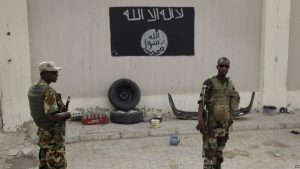As Senegal awaits rulings in the cases of 29 people recently tried on terrorism-related charges, evidence that came out during the trials is making many people in the country uneasy, like reported by voanews.com.
“This trial opened the eyes of many Senegalese who have been living in denial, and who kept saying that this country never hosted terrorists,” said Abdou Khader Cisse, a journalist with a popular Senegalese news outlet, Dakaractu, who has been covering this issue for the past several years.
“‘They are among us’ — this is the most shared expression [about the terrorists] among our fellow citizens,” said Cisse.
The defendants are Senegalese jihadists accused of working with and fighting for terrorist groups in other African countries, as well as an influential Salafist imam accused of radicalizing and providing material support to terror organizations.
The 29 suspects — all but one of them men — were tried between April 9 and May 31 by a special criminal chamber in Dakar. Rulings are expected July 19.
Boko Haram recruiting
The overwhelming majority of Senegal’s Muslim population belongs to one of four main Sufi sects that dominate the country.
“[They are] generally open-minded, tolerant,” said Jacob Zenn of the Jamestown Foundation. According to Zenn, Senegal has seen the appearance of a stricter and more orthodox form of Islam in the form of Wahhabism.
Most of the suspects are believed to have traveled to Nigeria and fought for Boko Haram, while others went to fight for jihadists in Libya and Mali.
“Those who went to Nigeria were part of a similar network as those in Libya, and those in Nigeria saw major events and battles, including Boko Haram at its peak, when Abubakar Shekau declared an ‘Islamic State’ near Gwoza in 2014,” Zenn said.
“I think Senegal faces more of a regional as opposed to a domestic-specific threat as a state,” said Ryan Cummings, the director of a security risk consultancy firm, Signal Risk, based in South Africa.
He says that in 2012, the grand imam of Bignona, a town in southern Senegal, said that Nigerians came to a local mosque and actively recruited for Senegalese nationals to join the Boko Haram insurgency in Nigeria. At the time, Senegalese authorities didn’t pay much attention to the claim. As it turned out, about a dozen Senegalese joined Boko Haram, led by Makhtar Diokhane.
Key suspects on trial
Diokhane was tried this year, not only for fighting for Boko Haram in Nigeria, but also for receiving 6 million Nigerian naira (about $30,000 at the time) from Shekau to set up a terror cell for the group in Senegal. He is also alleged to have recruited Senegalese for terror groups across Africa.
“He [Diokhane] was one of the ringleaders who moved between Senegal and Nigeria and arranged [for] the Senegalese foreign fighters to join Boko Haram,” said Zenn.
One of Diokhane’s wives, Coumba Niang, is being tried on charges of financing terrorism. She is accused of funneling money from her husband to prospective jihadists.
Meanwhile, Imam Alioune Ndao, a Salafist preacher from Kaolack, is facing a 30-year jail term for money laundering, providing material support to terrorist and possessing illegal arms.
Another suspect, Moustapha Diatta, came to the attention of Senegalese anti-terror authorities through his Facebook postings. Authorities were able to connect him to several accused jihadists and to Imam Ndao.
Inspiring or demoralizing
Many analysts warn that jihadists may target Senegal either because the ideology has been sown or because of its cooperation with international anti-terrorism operations.
“I think that Senegal, in its ongoing assistance to counterterrorism operations in Mali and the wider region, is certainly at a much higher risk of been potentially targeted,” Cummings told VOA.
Counterterror efforts in the country have been led by France and, to a lesser extent, the United States.
According to a spokeswoman for the U.S. military’s Africa Command, Samantha Reho, support for Senegal has been focused primarily on maritime security and peacekeeping activities.
“The U.S. has provided some advanced peacekeeping operations training that will be used as Senegal supports the MINUSMA mission in Mali,” Reho told VOA, referring to the acronym for the United Nations mission in Mali.
“The region has seen many formerly stable countries with high potential succumb to jihadism, such as Mali and even Burkina Faso. If it happened to Senegal, it would be completely demoralizing not just to Senegal but the entire continent,” Zenn said. “Yet, if Senegal tames the jihadist wave and succeeds politically and economically, it will be an inspiration and model for the region.”



